连词详解-新课(共79张PPT)
文档属性
| 名称 | 连词详解-新课(共79张PPT) |  | |
| 格式 | zip | ||
| 文件大小 | 10.9MB | ||
| 资源类型 | 试卷 | ||
| 版本资源 | 人教新目标(Go for it)版 | ||
| 科目 | 英语 | ||
| 更新时间 | 2021-06-07 14:58:59 | ||
图片预览


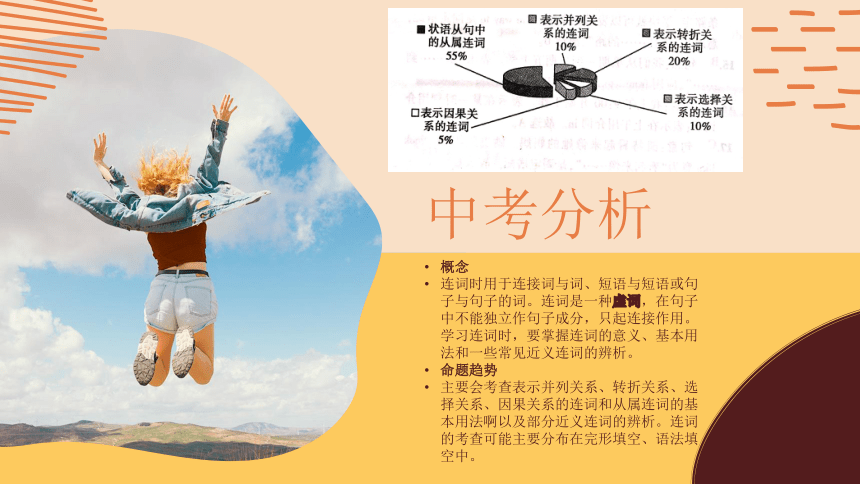
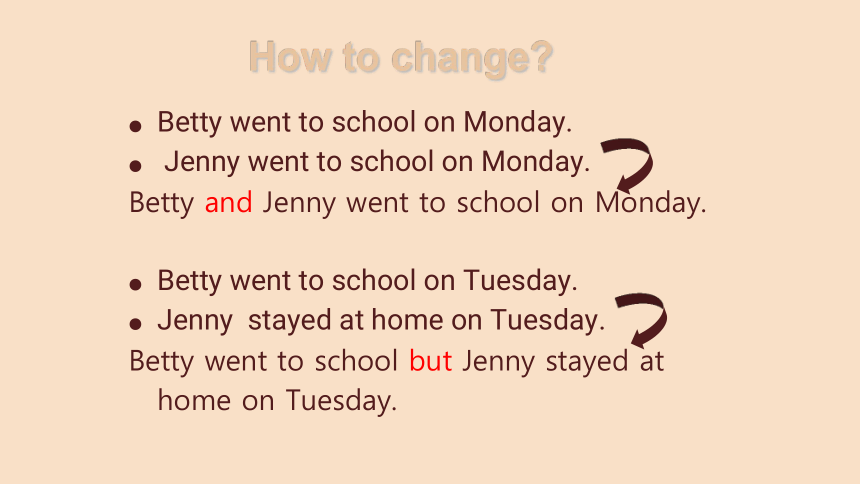
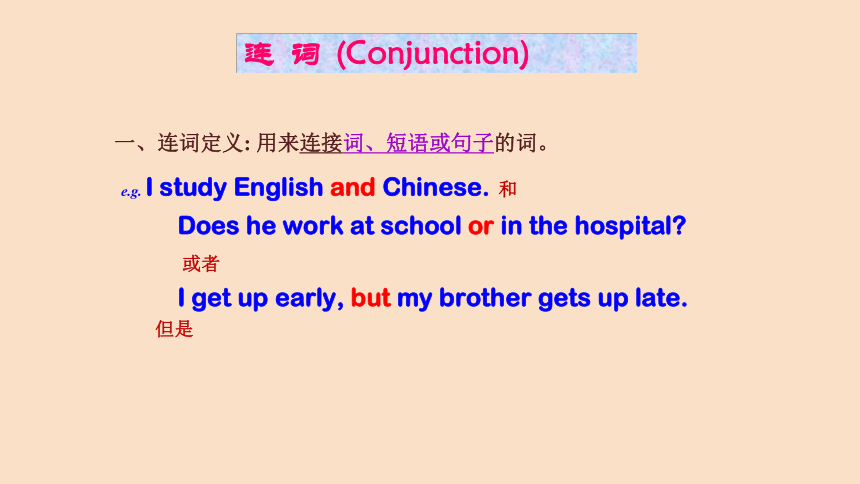

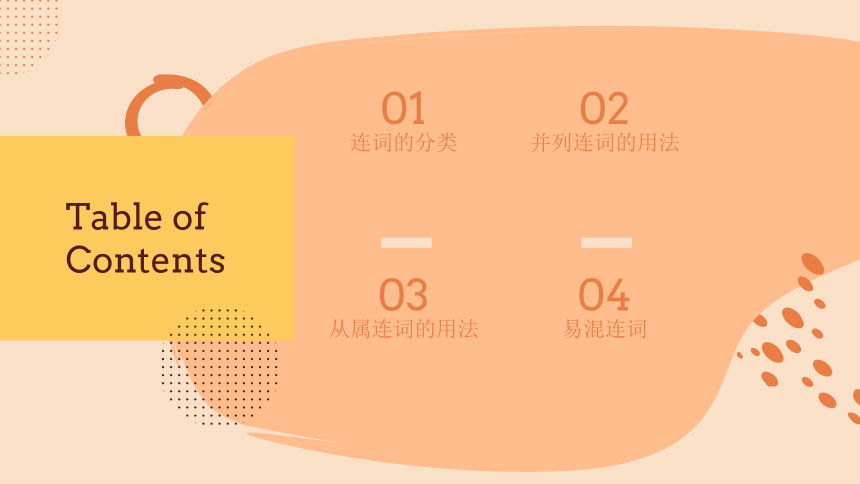
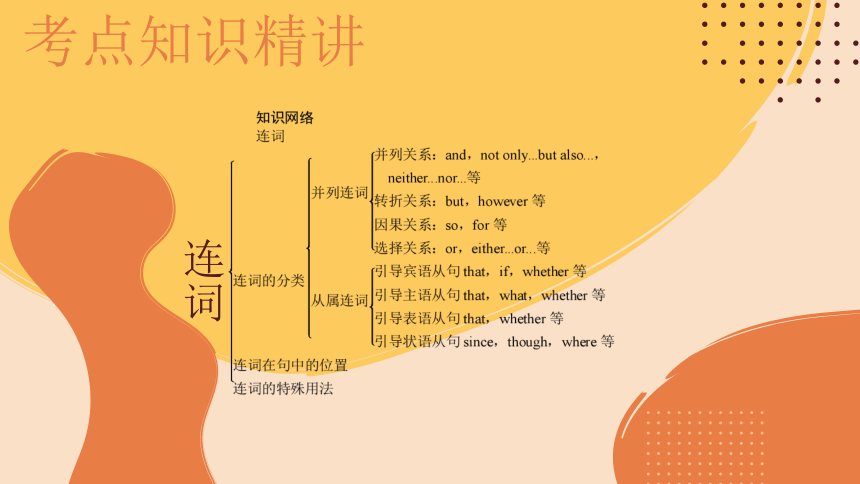

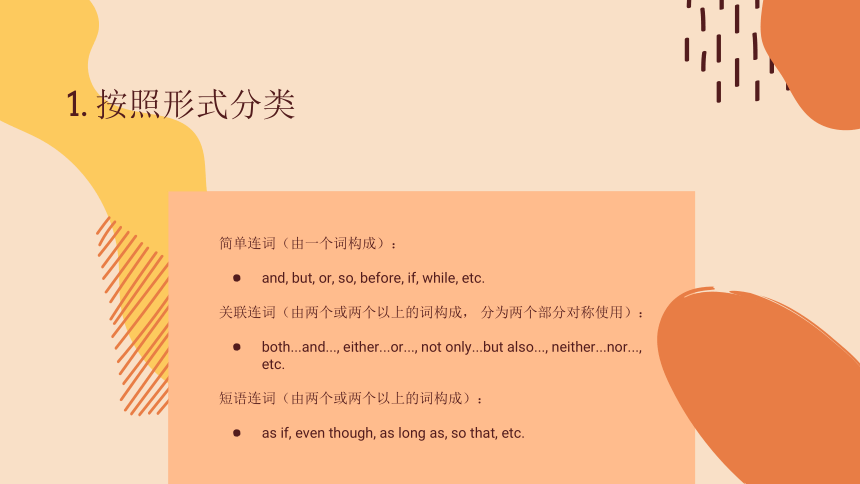
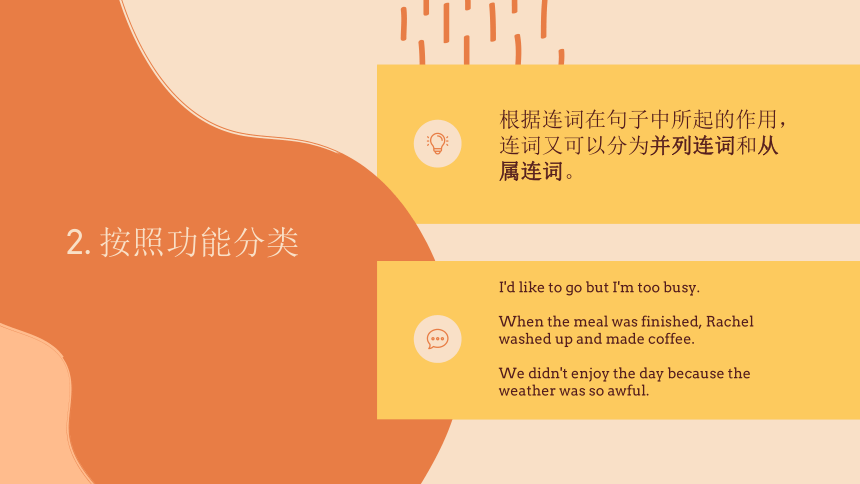

文档简介
(共79张PPT)
连词
conjunction
From
Shirley
中考英语对连词考查的重点集中在以下两个方面:一是连接两个词或连接一个并列句时并列/转折/选择/因果连词的选择,此类题型要求我们必须确切地理解句子的意义,在此基础上确定词与词之间及两个分句之间的关系,从而确定出正确的并列连词;二是对从属连词的考查侧重和从句的理解相联系,对应句子或上下文,正确把握从属连词。
考点解读
概念
连词时用于连接词与词、短语与短语或句子与句子的词。连词是一种虚词,在句子中不能独立作句子成分,只起连接作用。学习连词时,要掌握连词的意义、基本用法和一些常见近义连词的辨析。
命题趋势
主要会考查表示并列关系、转折关系、选择关系、因果关系的连词和从属连词的基本用法啊以及部分近义连词的辨析。连词的考查可能主要分布在完形填空、语法填空中。
中考分析
How
to
change?
Betty
went
to
school
on
Monday.
Jenny
went
to
school
on
Monday.
Betty
and
Jenny
went
to
school
on
Monday.
Betty
went
to
school
on
Tuesday.
Jenny
stayed
at
home
on
Tuesday.
Betty
went
to
school
but
Jenny
stayed
at
home
on
Tuesday.
连
词
(Conjunction)
一、连词定义:
用来连接词、短语或句子的词。
e.g.
I
study
English
and
Chinese.
和
Does
he
work
at
school
or
in
the
hospital?
或者
I
get
up
early,
but
my
brother
gets
up
late.
但是
二、连词分类:
并列连词
从属连词——
连词:and,
but,
or,
so,
(for)
连词词组:
either…or,
neither…nor,
not
only…but
also,
both…and,
(as
well
as)
that,whether,
if,
unless,
while
/
when,
until,
because,
so
that,
so…that,
though/
although,
even
if,
as…as
等
Table
of
Contents
并列连词的用法
02
易混连词
04
连词的分类
01
从属连词的用法
03
连词
考点知识精讲
连词的分类
01
简单连词(由一个词构成):
and,
but,
or,
so,
before,
if,
while,
etc.
关联连词(由两个或两个以上的词构成,
分为两个部分对称使用):
both...and...,
either...or...,
not
only...but
also...,
neither...nor...,
etc.
短语连词(由两个或两个以上的词构成):
as
if,
even
though,
as
long
as,
so
that,
etc.
1.
按照形式分类
2.
按照功能分类
根据连词在句子中所起的作用,连词又可以分为并列连词和从属连词。
I'd
like
to
go
but
I'm
too
busy.
When
the
meal
was
finished,
Rachel
washed
up
and
made
coffee.
We
didn't
enjoy
the
day
because
the
weather
was
so
awful.
并列连词的用法
02
并列连词所连接的两个或多个词、短语或句子都是对等或并列的关系,所以,并列连词又称对等连词。它主要用来表示并列关系、
转折关系、选择关系和因果关系。
1.表示并列关系
表示平行或对等关系,表示并列关系的常见连词有and,
both...and...,
neither...nor...,
not
only...but
also...,
as
well
as.
1.
and可以用来连接两个或两个以上的词、短语或句子
He's
gone
to
get
some
fish
and
chips.
That's
why
I
like
reading
books
and
I
study
harder
in
class.
They
sang
and
danced
all
night.
2.
可以用来连接两个并列的主语、谓语、宾语、表语和状语等
both...and...两者都……
neither...nor...既不……也不……
not
only...but(also)...不但……而且……
when就在这时,突然……
He
is
both
my
best
friend
and
my
neighbour.
He
learns
not
only
English
but
also
Japanese.
She
can
neither
read
nor
write.
He
is
a
scientist
as
well
as
a
poet.
Yesterday
evening
I
was
playing
the
piano
when
the
doorbell
rang.
and
和
用于肯定句
or 或者
用于否定句和疑问句
I
like
eating
apples
and
bananas.
I
don’t
like
eating
oranges
or
pears.
Do
you
like
eating
bananas
or
apples?
and
or
or
F
F
F
eating
sing
talked
and
(“和,并且”)
与
or
(“否则”)
“and”
连接平行结构。
考点:
1)判断改错:
They
sat
down
and
talk
about
something.
They
started
to
dance
and
sang.
I
saw
two
men
sitting
behind
and
ate
there.
(1)肯定句中用“and”
表“和”;
(2)否定句中用“or”表“和”
。
2)翻译:①
我喜欢英语和数学。
②
我不喜欢英语和数学。
I
like
English
_____
math.
I
don’t
like
English
____
math.
and
or
=Study
hard,
_____
your
math
will
be
worse.
3)用
“and”
或“or”
填空:
Study
hard,
_____
your
math
will
be
better.
and
or
“and”意为“这样,那么”;
“or”
意为
“否则”
。
both...and...
两个都;既...又...
I
am
a
teacher.
My
mother
is
a
teacher
too.
Both
my
mother
and
I
are
teacher.
as
well
as
=and表示“也”的意思,
I
like
swimming
and
skiing.
=
I
like
swimming
as
well
as
skiing.
neither…nor…既不…也不…
Peter
doesn't
like
Maths.
Jenny
doesn’t
like
Maths.
Neither
Peter
nor
Jenny
likes
Maths.
I
don’t
like
Maths.
I
don’t
like
PE.
I
like
neither
Maths
nor
PE.
—______Rose_____
Jack
watched
Prince
William’s
wedding
on
TV
yesterday.
—What
a
pity!
They
missed
the
exciting
moment.
A.
Both;and
B.
Not
only;but
also
C.Either;or
D.
Neither;
nor
not
only…but
also…
不但…而且
The
teacher
wants
to
buy
the
book.
The
students
want
to
buy
the
book.
Not
only
the
teacher
but
also
the
students
want
to
buy
the
book.
and
和
用于肯定句
or
或者
用于否定句和疑问句
both...and...
两个都;既...又...
as
well
as
=and
表示“也”的意思,
neither…nor…既不…也不…
not
only…but
also…
不但…而且
Review
高频考点
both...and...连接两个并列主语时,谓语动词用复数形式。
neither...nor...和not
only...but
also...用于连接两个并列主语时,谓语动词与靠近它的主语保持一致,即“就近原则”。
as
well
as用于连接两个并列主语时,谓语动词与as
well
as前面的主语保持一致。
Both
my
father
and
my
mother
are
teachers.
Not
only
he
but
also
I
am
good
at
English.
Neither
he
nor
I
am
a
doctor.
Jane
as
well
as
her
parents
is
taking
a
holiday
in
China.
重点拓展
not
only...but
also...连接两个并列分句时,若not
only置于句首,not
only后的分句要用部分倒装,but
also
后的分句不倒装。
Not
only
is
she
clever,
but
also
she
is
kind-hearted.
Not
only
can
the
art
bring
happiness
to
others,
but
it
also
shows
that
even
cold,
hard
iron
can
be
brought
back
to
life
with
a
little
creativity.
Neither
Peter
nor
Jenny
likes
Maths.
Neither
I
nor
she
has
seen
the
movie.
Neither
you
nor
I
am
students
of
that
school.
【连接主语
时,谓语“就近原则”】
either
A
or
B
“或者A或者B”
neither
A
nor
B
“既不A也不B”
not
only
A
but
also
B
“不仅A而且B”
---
连词词组
:
①Either
you
or
I
_____
going
to
the
party.
(或者你或者我将去晚会。)
②Neither
I
nor
he
______
seen
the
movie.
(我和他都没有看过这部电影。)
③Not
only
you
but
also
he
________
French.
(不但你而且他也讲法语。)
【连接主语
时,谓语“就近原则”】
am
has
speaks
考点
2.表示转折关系
but但是 however,yet然而 while然而
while常用来表示前后鲜明的对比
She
does
not
speak
our
language
and
yet
she
seems
to
understand
what
she
say.
He
is
a
doctor
while
I
am
a
teacher.
He
worked
hard,
yet
he
failed.
3.表示选择关系
or或者;否则(用于连接两个或两个以上的并列成分)
either...or...或者……或者……
在并列的否定句中,用or代替and构成完全否定,如果所连接的两部分都有否定词,用and而不用or连接。
When
you
are
learning
English,use
it,or
you
will
lose
it./
Would
you
like
a
coffee
or
something?
The
shoes
don't
fit
me.They're
either
big
or
small./
Either
you
or
she
is
wrong.(就近原则)
Sonia
never
cleans
or
even
offers
to
wash
the
dishes./
It
has
no
eyes
and
no
ears.
4.表示因果推理关系
for因为,此时它引导的从句只能位于句尾,前面用逗号隔开。
We
must
start
early,
for
it
will
take
two
hours
to
drive
to
the
airport.
2.转折/3.选择/4.因果
表转折的连词but
和however:
e.g.
(他努力工作,但以失败告终。)
He
worked
hard,
______
he
failed
at
last.
He
worked
hard.
_________,
he
failed
at
last.
区别:
but
后没有逗号,直接连接分句;
however
后有逗号相隔,可放句末。
but
However
考点
:
选择连词
:
1.or否则,
2.either…or或者……或者
I
must
work
hard,
or
I‘ll
fail
in
the
exam.
One
of
you
is
a
doctor.
Either
you
or
she(he)
is
a
doctor.
(谓语动词临近原则)
-Which
would
you
like,
tea
or
coffee?
-Either
____Ok,
but
I
prefer
coffee_____milk.
is,
has
B.
are,
with
C.
is,
with
D.
are,
has
so
所以
He
wanted
to
learn
more,
___
he
went
abroad
to
study.
She
didn’t
like
eating
KFC,
____she
went
to
McDonald's.
so
so
because
因为
I
did
it
_______
they
asked
me
to
do
it.
我做这事是因为他们请我做啊!
because
高频考点
“祈使句+and+简单句”
其中祈使句相当于一个肯定的条件状语从句,并列连词and引导的简单句常用一般将来时。
Go
at
once,
and
you
will
see
her.=
If
you
go
at
once,
you
will
see
her.
“祈使句+or+简单句”
其中祈使句相当于一个否定的条件状语从句,并列连词or引导的简单句常用一般将来时。
Put
on
your
overcoat,
or
you
will
catch
a
cold.=
If
you
don't
put
on
your
overcoat,
you
will
catch
a
cold.
(
)
—Look!
There
lots
of
traffic
in
this
city.
—
we
should
be
careful
when
we
cross
the
streets.
A.
is,
But
B.
are,
But
C.
is,
So
D.
are,
Or
1.
We
bought
Granny
a
present,
___
she
didn't
like
it.
A.
but
B.
and
C.
or
D.
so
[答案]
A.
[析]
由于句意的原因,应选择转折连词。
2.
Run
quickly,
___
we'll
miss
the
early
train.
A.
and
B.
but
C.
so
D.
or
[答案]
D.
[析]
or这里应译为:否则。
3.-
Which
would
you
like
better,
tea
___
milk?
-
Tea,
please.
A.
but
B.
and
C.
or
D.
with
[答案]
C.
[析]
在疑问句与否定句中应用or来表示一种选择。
—
Why
can’t
the
boy
understand
what
the
American
teacher
said?
—
Because
he
is
a
beginner,
_____he
knows
_____English.
A.
and
;
a
little
B.
and
;
little
C.
/
;
little
D.
so;
a
little
从属连词的用法
03
从属连词通常引导一个从句。可以分为引导名词性从句的从属连词和引导状语从句的从属连词。
1.引导名词性从句
从属连词引导的名词性从句主要有主语从句、宾语从句、表语从句和同位语从句。初中阶段主要学习的是宾语从句。
引导宾语从句的从属连词主要有:
在句中不作任何成分的连词that(无具体意义),if(是否),whether(是否,可与or
not连用)。
在ask,wonder,not
know,
want
to
know,not
be
sure等后常用whether或if从句,而不用that从句。
The
foreigner
asked
me
if
I
could
speak
English.
She
said
that
he
would
come.
I
wonder
if
she
is
ill.
I
don't
know
when
she
arrived
yesterday.
I
like
to
follow
the
story
and
see
what
happens
next.
引导名词性从句的连接词还有:
在从句中充当主语或宾语成分的连接代词what,
who/whom,
which等和在从句中充当状语成分的连接副词when,
where,
why等。
whether/if(是否)
if
能引导宾语从句
Please
tell
me
whether
it
is
true
or
not.
请告诉我这是否是正确的。
I
haven't
decided
whether/if
I'll
go
with
you.
我还没有决定是否跟你走。
2.引导状语从句
状语从句共有九类,这些状语从句各有从属连词作引导词。
1.引导时间状语从句的主要有when,while,as,whenever,
after,before,until/till,since,as
soon
as,
once等。
When
the
family
came
here
from
Russia,
they
were
penniless.
The
phone
rang
while
I
was
having
dinner.
You
must
close
all
the
doors
and
windows
before
you
leave
the
laboratory.
I
have
made
quite
a
few
friends
since
I
came
here.
I
arrived
at
the
airport
after
the
plane
had
taken
off.
as
soon
as
一……就
I’ll
tell
him
the
news
as
soon
as
I
see
him.
我一看到他就会告诉他这个消息。
考点
我会一直工作到你回来。
I
will
work
till
you
come
back.
not…until/
till
直到……才
…till
直到……为止
翻译:我会到你回来时才睡觉。
I
won’t
go
to
bed
until/
till
you
come
back.
考点
我父亲直到我们吃完饭时才回来。
My
father
______
come
back
until
we
had
supper.
not…until/
till
直到……才
…till
直到……为止
翻译:他直到3岁才会讲话。
He
______get
up
until
his
mother
wakes
him
up.
didn’t
他经常等到妈妈叫他才起床。
He
_________
speak
until
he
was
3.
couldn’t
doesn’t
since
自从
It
has
been
three
years
_______
we
met
in
1988.
自从1988年我们见面后,这又过了三年了。
since
状语从句
引导条件状语从句的主要有if(如果),unless(除非/如果不),as
long
as(只要)等。当从句中需用一般将来时的时候,总是用一般现在时去代替。
The
sports
meeting
will
continue
unless
it
rains
this
afternoon.
Everything
is
possible
as
long
as
you
prepare
carefully.
引导原因状语从句的主要有because(因为),since(既然),as(由于)等。
More
and
more
kids
become
unhappy
because
they
have
too
many
activities
to
do.(不可加so)
Since
it
is
so
hot,
let's
go
swimming.
As
it
was
getting
dark,
we
soon
turned
back.
引导目的状语从句的主要有so
that(为了...),in
order
that(为了...)等。
She
worked
hard
so
that
everything
would
be
ready
in
time.
We
all
get
up
early
in
order
that
We
might
start
at
seven.
2.引导条件状语从句
3.引导原因状语从句
4.引导目的状语从句
If
&
Unless(if
not)
If
it
rains
tomorrow,
I
will
not
go
out.
如果明天下雨,我就不出去了。
You
will
never
learn
English
well
unless
you
pay
great
efforts
.
你永远都学不好英语除非你努力去学了。
-David,
turn
off
the
TV________
no
one
is
watching
it.
-But
it
________off
already!
The
music
is
from
the
radio.
So
that,
has
been
turned
When,
has
turned
If,
has
been
turned
Because,
has
turned
状语从句
引导让步状语从句的主要有even
if/even
though(即使),although/though(虽然/尽管)等。but和although/though不能同时出现在一个句子中。although
比though更正式。
The
story
is
hard
to
understand
though
there
are
no
new
words
in
it.
Although
in
poor
health,
she
continued
to
carry
out
her
duties.
He
will
come
on
time
even
though
it
rains.
引导结果状语从句的主要有so/so
that(结果...),so...that.../such...that...(如此...以至于...)等。
The
mountain
was
so
steep
that
few
people
in
our
city
reached
the
top.
One
year,
the
weather
was
so
dry
that
no
food
would
grow.
引导地点状语从句的主要有where(在...地方),wherever(无论何处)等。
I'll
meet
him
where
I
first
met
you.
We'll
go
wherever
you
like.
5.引导让步状语从句
6.引导结果状语从句
7.引导地点状语从句
Though/
Although
尽管
Though/
Although
he
is
only
6
years
old,
he
can
cook
himself.
尽管他才六岁,他就会自己做饭了。
—Mr.Lee_____to
a
student
when
I
entered
the
classroom
this
morning.
—He
is
very
patient_____he
is
young.
A.
talking;but
B.talks:though
C.was
talking;though
D.talked;however
观察句子
:
(1)Although
he
is
over
sixty,
but
he
works
as
hard
as
others.
改为:Although
he
is
over
sixty,
he
works
as
hard
as
others.
或
He
is
over
sixty,
but
he
works
as
hard
as
others.
(2)“Because
John
was
ill,
so
I
took
him
to
the
doctor.”
although/
though
和but这两个关联词不能同时用。
???
同样,此句错误,
because
和
so
等关联词都不能同时使用。
考点:
so/such…
that
太…以至于…
She
was
so
beautiful
that
everyone
looked
at
her.
Jenny太漂亮了,以至于所有人都看着她。
She
is
such
a
kind
teacher
that
students
like
her
very
much.
她是个好老师,所以她的学生都非常喜欢她。
so+形容词
+that……
such+名词或名词短语+that
I’m
_____
tired
that
I
can’t
walk
any
farther.
It
was
______
a
warm
day
that
he
went
swimming.
so
such
He
took
the
MP3
player
with
him
_____
he
could
enjoy
music
during
the
trip.
A.
because
B.
so
that
C.
when
B
考点
他起早是为了赶上早班车。(表目的)
①He
got
up
early
so
that
he
could
catch
the
early
bus.
②He
got
up
early
so
that
he
caught
the
early
bus.
他起早,结果赶上了早班车。(表结果)
He
got
up
so
early
that
he
caught
the
early
bus.
so…that
so
that:①为了;②
所以,结果
如此……以致
状语从句
8.
引导比较状语从句
引导比较状语从句的主要有than(比...更...),as...as...(和...一样...),not
as/so...as...(不如...)等,
在as(so)...as中,后一个as是连词,引导比较状语从句。
Do
you
think
that
art
is
as
interesting
as
music?
Natalie
was
prettier
than
her
sister.
He
doesn't
earn
as
much
as
I
do.
9.
引导方式状语从句
引导方式状语从句的主要有as(正如...),as
if/as
though(好像)等。
As
you
can
see,
in
some
ways
we
look
the
same,
and
in
some
ways
we
look
different.
易混清单
04
when,while,as
三者均可译为“在……时候”。
when引导的从句,动词既可以是延续性的,也可以是终止性的。一般来说,当主句的动作正在进行时,when引导的从句的动作才发生;
while引导的从句中,动词只能是延续性的,一般来说,当while引导的从句的动作正在进行时,主句的动作才发生;
as表示随着短暂动作的发生,另一行为伴随发生。
He
was
riding
to
school
when
he
was
hit
by
a
car
this
morning.当他被一辆小汽车撞到的时候他正骑车上学。
You'd
better
turn
off
the
water
while
you
brush
your
teeth.当你刷牙的时候你最好关掉水。
She
sang
as
she
walked.
她一边走一边唱歌。
1.
when,while,as
when,
while,
as
,
(1).when
在---时刻或时期,可指时间点或时间段,从句动词是终止或持续动词。
When
I
got
home,
he
was
having
supper.
当我回到家,他正在吃饭。
When
I
was
young,
I
liked
dancing.
当我年轻的时候,我喜欢跳舞。
(2).while+时间段,不是时间点,从句的动词只限于持续动词(stand,
sleep,
sit,
keep).
Mother
was
cooking
___
she
___
a
knock
at
the
door.
when,
listen
to
B.
while,
listened
to
C.
while,
heard
D.
when,
heard
[答案]
D.
when在这里应译为:就在那时,那一刻,那一瞬间。
While
I
slept,
a
thief
broke
in.
Mr.
White
was
taking
a
shower
_____
the
UFO
landed
on
the
street.
A.
where
B.
while
C.
when
D.
whether
C
While
Mr.
White
was
taking
a
shower,the
UFO
landed
on
the
street.
考点
“when”
和
“while”
when引导的状语从句的动作多为终止性动词,也为可持续动词;但while只能是可持续动词。
as用作连词时,含义比较多,
A)引导时间状语从句。
(1)用“as
soon
as”结构,意思是“一……就”。例如:
Please
e-mail
me
as
soon
as
you
get
there.请你一到那里就给我发电子邮件。
I'll
tell
him
the
news
as
soon
as
he
comes
back.他一回来我就把这个消息告诉他。
(2)作“与……同时、一边……一边、当……的时候”讲时,强调主从句的动作同时发生,而从句的谓语动词必须是延续性动词。例如:
He
read
the
letter
as
he
walked
along
the
river.他一边沿着河边走,一边读信。
As
I
waited
at
the
stop,
I
heard
a
big
noise.我在车站候车的时候,听到了一声巨响。
B)引导比较状语从句。
用于“as...as”结构中,第一个as是副词,第二个as是连词。否定句用not
as/so...as结构。例如:
He
sings
as
well
as
his
brother.
他唱歌和哥哥一样好。
Canoeing
is
not
as/so
interesting
as
sailing.划独木舟没有航海有趣。
C)引导原因状语从句。
表示明显的原因,意思是“由于、鉴于”。例如:
We
all
like
her
as
she
is
kind.
我们都喜欢她,因为她善良。
As
you're
tired,
you'd
better
have
a
rest.
因为你疲劳,你最好休息一下。
as
D)引导让步状语从句。
作“虽然、尽管”讲时,相当于though,但是没有as常用。例如:
As/Though
they
were
tired,they
still
walked
on.
尽管很累,他们还是继续走。
(=Tired
as/though
they
were,they
still
walked
on.)
As
I
like
it,
I
will
not
buy
it.虽然我喜欢这个东西,但是我不想买。
E)引导方式状语从句,意为“按照、如同”。如:
I
have
changed
it
as
you
suggested.我已经按照你的建议修改了。
As
two
is
to
three,four
is
to
six.四比六等于二比三。
含有as的短语和固定搭配常见的有:
(1)as
well
as也 (2)as
if
好像
(3)the
same
as
和……一样
(4)such
as
例如 (5)as...as
possible
尽可能 (6)so
as
to
为了要、以便
(7)as
soon
as
一……就 (8)as
a
matter
of
fact事实上/实际上
(9)as
for
至于 (10)as
well
也(=also/too)
(11)not
only...but
also...不但……而且
(12)both...and...既……又……
as
as用作介词,意为“如同、作为、当作”,与介词like不同,as表示某人/物看起来完全一样或几乎相同,而表示相似关系,但不等同。如:
Don't
have
him
as
a
servant.
不要把他看作仆人。
He
works
as
a
servant.
他以仆人的身份工作着。
试比较:He
works
like
a
servant.
他像仆人一样工作。
(实际上不是。)
as作“作为”讲时,相当于being。如:
As
a
student,
it's
bad
manners
to
be
late
for
class.
作为学生,迟到是不礼貌的。(=Being
a
student,it's
bad
manners
to
be
late
for
class.)
as常与动词连用,构成短语或固定搭配如:
look
upon...as把……看作;regard...as把……认为是/把……看作;act
as担任、充当等。
as用作副词,意思是“同样地”,通常用来修饰副词或形容词。如:
He
works
hard,but
I
study
just
as
hard.他努力学习,我学习也一样努力。
Their
shool
is
as
beautiful
as
ours.他们的学校和我们的学校一样美丽。
as
when用作连词,
引导时间状语从句,意为“当……的时候”。如:
She
wants
to
be
a
scientist
when
she
grows
up.她长大后想当科学家。
When
the
game
began,I
was
waiting
for
a
taxi.当比赛开始时,我在等出租车。
when可以引导宾语从句,后面跟陈述句语序,意思是“什么时候、何时”。如:
Please
tell
me
when
you
came
here.请告诉我你是什么时候到的。
He
asked
when
the
game
would
start.他问比赛什么时候开始。
when用作疑问副词,意为“什么时候、何时”,引导特殊疑问句,可以问时间点,也可以问
时间段。如:
—When
do
you
usually
go
to
school
every
day?—At
six
o'clock.
—When
will
he
be
back?—In
a
week.
—When
were
you
born?—I
was
born
in
1995.
when
while用作连词时,意为“当……的时候、和……同时”,
引导时间状语从句,从句只能指时间段,不能指时间点,谓语动词必须是延续性动词或状态动词。如:
Strike
while
the
iron
is
hot.
趁热打铁。
Somebody
broke
into
the
house
while
we
were
out.我们外出时有人破门而入。
引导让步状语从句,意为“虽然、尽管”。如:
While
I
admit
his
good
points,I
can
see
his
shortcomings.尽管我承认他的优点,我还是看到他的缺点了。
while用作名词,意思是“一会儿、一段时间”。如:
Please
wait
a
while.
请稍等。
I
haven't
seen
him
for
a
long
while.
我好久没有看到他了。
while
because
表示理由或直接原因,意思是“因为”,语气最强。引导原因状语从句时,常用于句子中间,位于句首时,要用逗号隔开。单独成句时,通常用来回答why所提出的问题。例如:
I
like
my
parrot
because
it
can
sing.
Pandas
are
my
favorite
animals
because
they're
very
cute.
—Why
do
you
like
giraffes?—Because
they
are
very
interesting.
because表示理由/原因时,不能与so直接连用。汉语中,表示因果关系时要用“因为……所以……”;而英语中,用because就不用so,用so就不用because。试比较:
Nick
caught
a
bad
cold
yesterday,so
he
had
to
stay
at
home.
Because
Nick
caught
a
bad
cold
yesterday,he
had
to
stay
at
home.
because
可以与of连用,构成介词短语
because
of,之后跟名词、代词、词组或短语表示理由/原因。如:
He
has
poor
eyesight
because
of
doing
lots
of
computer
work.
The
match
was
put
off
because
of
the
bad
weather.
2.
because,since,as,for
since
表达明显的或已知的理由,意为“既然”。since
引导的从句常用于句首,语气不如because,但是比as语气强。引导的从句位于句子末尾时,可以作为补充说明。如:
Since
everybody
is
here,
let's
begin.既然大家都到了,那我们就开始吧。
Since
you
don't
want
to
go
there,
I
won't
force
you
to.既然你不想去,我也不勉强你。
I'll
go
to
ask
someone
else,
since
you
have
no
time.既然你没有时间,我就去找别人。
as
表示理由时,意为“由于”,引导原因状语从句时,主、从句并重,主句说明原因,从句说明结果,相当于since,但是语气不如since。如:
As
it
was
late,I
left
in
a
hurry.因为天色已晚,我就匆忙离开了。
As
I'm
very
busy,I
can't
go
with
you.我很忙,所以不能和你一起去。
for是并列连词,表明附加或推断的理由,
常用于口语中,意为“因为”。for连接的句子一般不用于句首,并列句之间可以用逗号分开。如:
I
must
be
away
for
a
week,for
I'll
go
to
Shanghai.我要离开一个星期,因为我要去上海。
He
must
be
at
home,for
the
light
in
the
room
is
on.他一定在家,因为房间里的灯亮着。
I'm
late
for
class
for
I
got
up
late.我上学迟到是因为我起床迟了。
2.
because,since,as,for
so...that...,such...that...
so+形容词/副词+that从句;
so+形容词+a/an+可数名词的单数+that从句;
so+形容词+复数名词+that从句;
so+many/much/few/little+名词+that从句;
such+a/an+形容词+可数名词单数+that从句;
such+形容词+不可数名词/可数名词复数+that从句。
Hangzhou
is
so
beautiful
a
city
that
lots
of
visitors
come
here
every
year.杭州如此美以至于每年许多游客来这。
She
is
such
a
good
girl
that
we
all
like
her.她是如此好的一个女孩,以至于我们大家都喜欢她。
There
are
so
many
students
on
the
playground.操场上有如此多的学生。
3.
so...that...such...that...
so...that...意为“如此……以至于……”,
so是副词,后面跟形容词或副词,that后面跟句子表示结果,常见的句型结构有下面四种:
A.
so+形容词+that从句
The
novel
is
so
popular
that
it
ran
into
two
editions
in
a
year.这本小说是那么受欢迎,一年内就出了两版。
She
was
so
surprised
that
she
just
stood
there.她是如此吃惊,就呆呆地站在那里。
B.
so+副词+that从句
He
drove
so
fast
that
he
found
it
difficult
to
stop
at
the
red
light.
他开车那么快,发现红灯时已无法刹车了。
His
friends
were
walking
so
slowly
that
he
began
to
feel
bored.
他的朋友走得那么慢,他开始感到厌倦。
C.
so+形容词+a+单数名词+that从句
It
is
so
heavy
a
stone
that
I
can't
lift
it.这么重的一块石头,我举不起来。
It
is
so
lovely
a
day
that
I'd
like
to
go
swimming.如此好的天气,我想去游泳。
D.
so+形容词+复数名词+that从句
He
had
so
many
falls
that
he
was
black
and
blue
all
over.他摔了那么多跤,以致浑身青一块、紫一块。
There
were
so
many
people
in
the
street
that
our
car
couldn't
cross.
街上的人那么多,我们的小汽车过不去。
so...that...
so...that...可以与以下结构转换:
A.
与too...to...结构的转换
too...to...意为“太……而不能……”,与so...that...结构互换时,that从句中必须使用情态动词can't(如果是过去时则用couldn't)。如:
He
was
so
clever
that
he
couldn't
make
such
stupid
mistakes.
→
He
was
too
clever
to
make
such
stupid
mistakes.
温馨提示:如果主从句的主语不一致,改为同义句时,要用too...for
sb.
to...结构。如:
That
question
is
so
difficult
that
I
can't
work
it
out.
→That
question
is
too
difficult
for
me
to
work
out.
B.
与enough
to
do/not
enough
to
do
结构的转换
a)与enough
to
do
sth.
结构的转换。
enough
to
do
sth.意为“……足够做某事”,与so...that...结构转换时,that从句中必须使用情态动词can。如:
You
are
so
healthy
that
you
can
get
back
to
school.
→
You
are
healthy
enough
to
get
back
to
school.
b)与not...enough
to
do结构的转换。
not...enough
to
do意为“没到做某事的……”,与so...that...结构转换时,that从句中必须使用含有否定意义的情态动词。enough前面的形容词是so...that...结构中so后面形容词的反义词。如:
The
boy
is
so
young
that
he
can't
dress
himself.
→The
boy
is
not
old
enough
to
dress
himself.
He
is
so
impatient
that
he
can't
wait.
→
He
is
not
patient
enough
to
wait.
so...that...
C.
与such...that...结构的转换
such...that...意为“这样……以至于……”,与so...that...结构转换时,必须用“so+形容词+a+单数名词+that从句”结构。如:
It
is
so
interesting
a
TV
that
all
of
us
want
to
see
it
again.
→
It
is
such
an
interesting
TV
that
all
of
us
want
to
see
it
again.
It
is
so
heavy
a
stone
that
I
can't
lift
it.
→
It
is
such
a
heavy
stone
that
I
can't
lift
it.
such...that结构中的such是个形容词,后接名词或名词短语。如:
It
was
such
a
hot
day
that
he
went
swimming.
如果在名词之前有many,much,little,few时,用so,不用such。如:
He
has
so
little
education
that
he
is
unable
to
get
a
job.
3.
so...that...such...that...
连词
考点知识精讲
H:“What
are
we
going
to
do,
my
dear?”
W:
“Go
shopping.”
H:“We
can
do
nothing
___________shopping.”
W:“In
fact,
_______
you
_____
I
like
shopping.”
H:
“Why
must
you
do
the
things
_____
you
don’t
like?”
W:
“___
my
skirts
are
out
of
style,
___
I
want
to
buy
a
new
one.”
W:(In
the
clothing
shop.)…I
don’t
know___
they
fit(适合)
me.
”
H:
“I
don’t
know
____________
you
really
like.
Just
go
inside
and
try
them
on.”
H:(对seller笑笑)
“Can
you
talk
to
me
for
a
few
minutes?”
S:Why?
H:Because
___________
my
wife
sees
(that)
I
am
talking
to
other
ladies,
she
will
be
angry
at
once
and
leave.
S:
“Then
why
do
you
let
her
go?”
H:
“I
want
to
leave
________
I
won’t
pay
for
them.”
根据对话内容,填入适当连词。
except/but
neither
nor
that
Because
或
so
if
what/
which
if/when/
as
soon
as
and/
so
that
1.
简单连词的选择
首先找出连词在句中是连接词与词、短语与短语还是连接句子与句子,以此来确定用并列连词还是从属连词。如果选择并列连词,应该根据具体的语境,通过句意来确定应该用表示平行或承接关系的连词、选择关系的并列连词还是表示因果关系的并列连词。
【例1】
(2014·北京·24)I'd
like
to
go
with
you,
I'm
too
busy.
A.
or
B.
and
C.
so
D.
but
【例2】
(2014·江西·30)
jeans
were
invented
over
100
years
ago,they're
still
in
fashion
today.
A.
Because
B.
If
C.
Although
D.
Since
2.
复合连词和短语连词的选择
复合连词和短语连词可以引导并列句和各种不同的复合句。常见的有:both...and...;either...or...;neither...nor...;as
well;not
only...but
also;as
soon
as.
【例】
(2013·内蒙古包头·32)One
important
aim
of
our
school
is
to
prepare
us
for
the
future
we
can
face
all
the
challenges
with
confidence.
A.
so
far
B.
so
that
C.
even
if
D.
if
only
3.
从属连词的选择
如果需要选择从属连词,应该根据主句与从句之间的关系确定是宾语从句还是状语从句。如果是状语从句,还要根据句意分析,从句是表示时间、条件、原因还是结果等。
然后确定所需的连词。
【例1】
(2014·河南·34)He's
not
a
perfect
child.
He
sometimes
talks
back
his
parents
talks
with
him.
A.
if
B.
before
C.
when
D.
until
【例2】
(2013·浙江义乌·19)I'll
probably
stay
with
my
friends
I
get
my
own
place
to
live
in.
A.
before
B.
when
C.
after
D.
because
【解析】 考查连词的用法。
由句子关系和句意“100多年前发明牛仔裤,现在仍然时髦”判断,该句是让步状语从句。故选C。
【解析】 考查短语连词的辨析。
so
far到目前为止;so
that
以至于;even
if
即使;if
only
如果;由句意“我们学校的一个重要目标是为我们的将来做准备以至于我们能够有信心面对各种挑战”判断,该句是因果关系,应该用短语连词so
that来连接。故选B。
【解析】 考查连词的用法。由句意“他不是个完美的孩子,他父母和他谈话时,他有时顶嘴”和句子之间的关系判断,该句是时间状语从句,不是条件状语从句。因为主句和从句的动作同时发生,不是前后发生的或“直到……为止”。故选
C。
【解析】 考查连词的用法。这是一个含有时间状语从句的复合句。A项表示“在……以前”,B项表示“当……的时候”,C项表示“在……之后”,D项表示“因为”。根据句意:“在我有自己的房子之前,我很可能和我的朋友们住在一起”,可知本题选A。
【解析】 考查连词的用法。由后一句中的“too
busy”判断,应该用but来连接,表示转折,不是选、递进或因果。
故选D。
考点训练
1.
—Mum,I
want
some
pocket
money.
—Well.
I
won't
give
it
to
you
you
wash
your
clothes.
A.
if
B.
unless
C.
while
D.
though
2.
the
car's
old,it
still
runs
well.
A.
Because
B.
So
C.
Although
D.
But
3.
He
is
very
glad
and
keeps
smiling,
he
has
already
known
the
good
news.
A.
as
if
B.
even
though
C.
even
if
D.
so
that
4.
—Do
you
know
the
girl
in
blue
is?
—I'm
not
sure.
May
be
a
teacher.
A.
whose
B.
how
C.
what
D.
which
5.
—Why
were
you
late
for
school
again
this
morning?
—I
was
about
to
go
shopping
it
began
to
rain.
A.
while
B.
as
C.
when
D.
though
6.
You
can
save
money
you
buy
cheaper
things.
A.
before
B.
unless
C.
if
D.
until
7.
Help
others
whenever
you
can
you'll
make
the
world
a
nicer
place
to
live
in.
A.
or
B.
and
C.
but
D.
so
8.
—How
was
your
climbing
Mount
Huang?
—I
didn't
believe
I
could
do
it
I
got
to
the
top.
A.
until
B.
while
C.
after
D.
though
9.
Cross
the
road
carefully,
you'll
keep
yourself
safe.
A.
so
B.
or
C.
but
D.
and
10.
Which
mobile
phone
would
you
like
to
buy,an
HTC
an
iPhone
5?
A.
and
B.
so
C.
but
D.
or
11.Wang
Dong
didn't
go
to
school
yesterday
he
was
ill.
A.
so
B.
if
C.
because
12.
Hurry
up,
you
will
miss
the
train.
A.
and
B.
so
C.
or
D.
but
13.
we
don't
save
water,we
will
have
no
water
to
drink
one
day.
A.
Where
B.
When
C.
Although
D.
If
14.
We
will
be
punished
we
break
the
law.
A.
until
B.
if
C.
unless
D.
though
THANKS
Does
anyone
have
any
questions?
935917873@
连词
conjunction
From
Shirley
中考英语对连词考查的重点集中在以下两个方面:一是连接两个词或连接一个并列句时并列/转折/选择/因果连词的选择,此类题型要求我们必须确切地理解句子的意义,在此基础上确定词与词之间及两个分句之间的关系,从而确定出正确的并列连词;二是对从属连词的考查侧重和从句的理解相联系,对应句子或上下文,正确把握从属连词。
考点解读
概念
连词时用于连接词与词、短语与短语或句子与句子的词。连词是一种虚词,在句子中不能独立作句子成分,只起连接作用。学习连词时,要掌握连词的意义、基本用法和一些常见近义连词的辨析。
命题趋势
主要会考查表示并列关系、转折关系、选择关系、因果关系的连词和从属连词的基本用法啊以及部分近义连词的辨析。连词的考查可能主要分布在完形填空、语法填空中。
中考分析
How
to
change?
Betty
went
to
school
on
Monday.
Jenny
went
to
school
on
Monday.
Betty
and
Jenny
went
to
school
on
Monday.
Betty
went
to
school
on
Tuesday.
Jenny
stayed
at
home
on
Tuesday.
Betty
went
to
school
but
Jenny
stayed
at
home
on
Tuesday.
连
词
(Conjunction)
一、连词定义:
用来连接词、短语或句子的词。
e.g.
I
study
English
and
Chinese.
和
Does
he
work
at
school
or
in
the
hospital?
或者
I
get
up
early,
but
my
brother
gets
up
late.
但是
二、连词分类:
并列连词
从属连词——
连词:and,
but,
or,
so,
(for)
连词词组:
either…or,
neither…nor,
not
only…but
also,
both…and,
(as
well
as)
that,whether,
if,
unless,
while
/
when,
until,
because,
so
that,
so…that,
though/
although,
even
if,
as…as
等
Table
of
Contents
并列连词的用法
02
易混连词
04
连词的分类
01
从属连词的用法
03
连词
考点知识精讲
连词的分类
01
简单连词(由一个词构成):
and,
but,
or,
so,
before,
if,
while,
etc.
关联连词(由两个或两个以上的词构成,
分为两个部分对称使用):
both...and...,
either...or...,
not
only...but
also...,
neither...nor...,
etc.
短语连词(由两个或两个以上的词构成):
as
if,
even
though,
as
long
as,
so
that,
etc.
1.
按照形式分类
2.
按照功能分类
根据连词在句子中所起的作用,连词又可以分为并列连词和从属连词。
I'd
like
to
go
but
I'm
too
busy.
When
the
meal
was
finished,
Rachel
washed
up
and
made
coffee.
We
didn't
enjoy
the
day
because
the
weather
was
so
awful.
并列连词的用法
02
并列连词所连接的两个或多个词、短语或句子都是对等或并列的关系,所以,并列连词又称对等连词。它主要用来表示并列关系、
转折关系、选择关系和因果关系。
1.表示并列关系
表示平行或对等关系,表示并列关系的常见连词有and,
both...and...,
neither...nor...,
not
only...but
also...,
as
well
as.
1.
and可以用来连接两个或两个以上的词、短语或句子
He's
gone
to
get
some
fish
and
chips.
That's
why
I
like
reading
books
and
I
study
harder
in
class.
They
sang
and
danced
all
night.
2.
可以用来连接两个并列的主语、谓语、宾语、表语和状语等
both...and...两者都……
neither...nor...既不……也不……
not
only...but(also)...不但……而且……
when就在这时,突然……
He
is
both
my
best
friend
and
my
neighbour.
He
learns
not
only
English
but
also
Japanese.
She
can
neither
read
nor
write.
He
is
a
scientist
as
well
as
a
poet.
Yesterday
evening
I
was
playing
the
piano
when
the
doorbell
rang.
and
和
用于肯定句
or 或者
用于否定句和疑问句
I
like
eating
apples
and
bananas.
I
don’t
like
eating
oranges
or
pears.
Do
you
like
eating
bananas
or
apples?
and
or
or
F
F
F
eating
sing
talked
and
(“和,并且”)
与
or
(“否则”)
“and”
连接平行结构。
考点:
1)判断改错:
They
sat
down
and
talk
about
something.
They
started
to
dance
and
sang.
I
saw
two
men
sitting
behind
and
ate
there.
(1)肯定句中用“and”
表“和”;
(2)否定句中用“or”表“和”
。
2)翻译:①
我喜欢英语和数学。
②
我不喜欢英语和数学。
I
like
English
_____
math.
I
don’t
like
English
____
math.
and
or
=Study
hard,
_____
your
math
will
be
worse.
3)用
“and”
或“or”
填空:
Study
hard,
_____
your
math
will
be
better.
and
or
“and”意为“这样,那么”;
“or”
意为
“否则”
。
both...and...
两个都;既...又...
I
am
a
teacher.
My
mother
is
a
teacher
too.
Both
my
mother
and
I
are
teacher.
as
well
as
=and表示“也”的意思,
I
like
swimming
and
skiing.
=
I
like
swimming
as
well
as
skiing.
neither…nor…既不…也不…
Peter
doesn't
like
Maths.
Jenny
doesn’t
like
Maths.
Neither
Peter
nor
Jenny
likes
Maths.
I
don’t
like
Maths.
I
don’t
like
PE.
I
like
neither
Maths
nor
PE.
—______Rose_____
Jack
watched
Prince
William’s
wedding
on
TV
yesterday.
—What
a
pity!
They
missed
the
exciting
moment.
A.
Both;and
B.
Not
only;but
also
C.Either;or
D.
Neither;
nor
not
only…but
also…
不但…而且
The
teacher
wants
to
buy
the
book.
The
students
want
to
buy
the
book.
Not
only
the
teacher
but
also
the
students
want
to
buy
the
book.
and
和
用于肯定句
or
或者
用于否定句和疑问句
both...and...
两个都;既...又...
as
well
as
=and
表示“也”的意思,
neither…nor…既不…也不…
not
only…but
also…
不但…而且
Review
高频考点
both...and...连接两个并列主语时,谓语动词用复数形式。
neither...nor...和not
only...but
also...用于连接两个并列主语时,谓语动词与靠近它的主语保持一致,即“就近原则”。
as
well
as用于连接两个并列主语时,谓语动词与as
well
as前面的主语保持一致。
Both
my
father
and
my
mother
are
teachers.
Not
only
he
but
also
I
am
good
at
English.
Neither
he
nor
I
am
a
doctor.
Jane
as
well
as
her
parents
is
taking
a
holiday
in
China.
重点拓展
not
only...but
also...连接两个并列分句时,若not
only置于句首,not
only后的分句要用部分倒装,but
also
后的分句不倒装。
Not
only
is
she
clever,
but
also
she
is
kind-hearted.
Not
only
can
the
art
bring
happiness
to
others,
but
it
also
shows
that
even
cold,
hard
iron
can
be
brought
back
to
life
with
a
little
creativity.
Neither
Peter
nor
Jenny
likes
Maths.
Neither
I
nor
she
has
seen
the
movie.
Neither
you
nor
I
am
students
of
that
school.
【连接主语
时,谓语“就近原则”】
either
A
or
B
“或者A或者B”
neither
A
nor
B
“既不A也不B”
not
only
A
but
also
B
“不仅A而且B”
---
连词词组
:
①Either
you
or
I
_____
going
to
the
party.
(或者你或者我将去晚会。)
②Neither
I
nor
he
______
seen
the
movie.
(我和他都没有看过这部电影。)
③Not
only
you
but
also
he
________
French.
(不但你而且他也讲法语。)
【连接主语
时,谓语“就近原则”】
am
has
speaks
考点
2.表示转折关系
but但是 however,yet然而 while然而
while常用来表示前后鲜明的对比
She
does
not
speak
our
language
and
yet
she
seems
to
understand
what
she
say.
He
is
a
doctor
while
I
am
a
teacher.
He
worked
hard,
yet
he
failed.
3.表示选择关系
or或者;否则(用于连接两个或两个以上的并列成分)
either...or...或者……或者……
在并列的否定句中,用or代替and构成完全否定,如果所连接的两部分都有否定词,用and而不用or连接。
When
you
are
learning
English,use
it,or
you
will
lose
it./
Would
you
like
a
coffee
or
something?
The
shoes
don't
fit
me.They're
either
big
or
small./
Either
you
or
she
is
wrong.(就近原则)
Sonia
never
cleans
or
even
offers
to
wash
the
dishes./
It
has
no
eyes
and
no
ears.
4.表示因果推理关系
for因为,此时它引导的从句只能位于句尾,前面用逗号隔开。
We
must
start
early,
for
it
will
take
two
hours
to
drive
to
the
airport.
2.转折/3.选择/4.因果
表转折的连词but
和however:
e.g.
(他努力工作,但以失败告终。)
He
worked
hard,
______
he
failed
at
last.
He
worked
hard.
_________,
he
failed
at
last.
区别:
but
后没有逗号,直接连接分句;
however
后有逗号相隔,可放句末。
but
However
考点
:
选择连词
:
1.or否则,
2.either…or或者……或者
I
must
work
hard,
or
I‘ll
fail
in
the
exam.
One
of
you
is
a
doctor.
Either
you
or
she(he)
is
a
doctor.
(谓语动词临近原则)
-Which
would
you
like,
tea
or
coffee?
-Either
____Ok,
but
I
prefer
coffee_____milk.
is,
has
B.
are,
with
C.
is,
with
D.
are,
has
so
所以
He
wanted
to
learn
more,
___
he
went
abroad
to
study.
She
didn’t
like
eating
KFC,
____she
went
to
McDonald's.
so
so
because
因为
I
did
it
_______
they
asked
me
to
do
it.
我做这事是因为他们请我做啊!
because
高频考点
“祈使句+and+简单句”
其中祈使句相当于一个肯定的条件状语从句,并列连词and引导的简单句常用一般将来时。
Go
at
once,
and
you
will
see
her.=
If
you
go
at
once,
you
will
see
her.
“祈使句+or+简单句”
其中祈使句相当于一个否定的条件状语从句,并列连词or引导的简单句常用一般将来时。
Put
on
your
overcoat,
or
you
will
catch
a
cold.=
If
you
don't
put
on
your
overcoat,
you
will
catch
a
cold.
(
)
—Look!
There
lots
of
traffic
in
this
city.
—
we
should
be
careful
when
we
cross
the
streets.
A.
is,
But
B.
are,
But
C.
is,
So
D.
are,
Or
1.
We
bought
Granny
a
present,
___
she
didn't
like
it.
A.
but
B.
and
C.
or
D.
so
[答案]
A.
[析]
由于句意的原因,应选择转折连词。
2.
Run
quickly,
___
we'll
miss
the
early
train.
A.
and
B.
but
C.
so
D.
or
[答案]
D.
[析]
or这里应译为:否则。
3.-
Which
would
you
like
better,
tea
___
milk?
-
Tea,
please.
A.
but
B.
and
C.
or
D.
with
[答案]
C.
[析]
在疑问句与否定句中应用or来表示一种选择。
—
Why
can’t
the
boy
understand
what
the
American
teacher
said?
—
Because
he
is
a
beginner,
_____he
knows
_____English.
A.
and
;
a
little
B.
and
;
little
C.
/
;
little
D.
so;
a
little
从属连词的用法
03
从属连词通常引导一个从句。可以分为引导名词性从句的从属连词和引导状语从句的从属连词。
1.引导名词性从句
从属连词引导的名词性从句主要有主语从句、宾语从句、表语从句和同位语从句。初中阶段主要学习的是宾语从句。
引导宾语从句的从属连词主要有:
在句中不作任何成分的连词that(无具体意义),if(是否),whether(是否,可与or
not连用)。
在ask,wonder,not
know,
want
to
know,not
be
sure等后常用whether或if从句,而不用that从句。
The
foreigner
asked
me
if
I
could
speak
English.
She
said
that
he
would
come.
I
wonder
if
she
is
ill.
I
don't
know
when
she
arrived
yesterday.
I
like
to
follow
the
story
and
see
what
happens
next.
引导名词性从句的连接词还有:
在从句中充当主语或宾语成分的连接代词what,
who/whom,
which等和在从句中充当状语成分的连接副词when,
where,
why等。
whether/if(是否)
if
能引导宾语从句
Please
tell
me
whether
it
is
true
or
not.
请告诉我这是否是正确的。
I
haven't
decided
whether/if
I'll
go
with
you.
我还没有决定是否跟你走。
2.引导状语从句
状语从句共有九类,这些状语从句各有从属连词作引导词。
1.引导时间状语从句的主要有when,while,as,whenever,
after,before,until/till,since,as
soon
as,
once等。
When
the
family
came
here
from
Russia,
they
were
penniless.
The
phone
rang
while
I
was
having
dinner.
You
must
close
all
the
doors
and
windows
before
you
leave
the
laboratory.
I
have
made
quite
a
few
friends
since
I
came
here.
I
arrived
at
the
airport
after
the
plane
had
taken
off.
as
soon
as
一……就
I’ll
tell
him
the
news
as
soon
as
I
see
him.
我一看到他就会告诉他这个消息。
考点
我会一直工作到你回来。
I
will
work
till
you
come
back.
not…until/
till
直到……才
…till
直到……为止
翻译:我会到你回来时才睡觉。
I
won’t
go
to
bed
until/
till
you
come
back.
考点
我父亲直到我们吃完饭时才回来。
My
father
______
come
back
until
we
had
supper.
not…until/
till
直到……才
…till
直到……为止
翻译:他直到3岁才会讲话。
He
______get
up
until
his
mother
wakes
him
up.
didn’t
他经常等到妈妈叫他才起床。
He
_________
speak
until
he
was
3.
couldn’t
doesn’t
since
自从
It
has
been
three
years
_______
we
met
in
1988.
自从1988年我们见面后,这又过了三年了。
since
状语从句
引导条件状语从句的主要有if(如果),unless(除非/如果不),as
long
as(只要)等。当从句中需用一般将来时的时候,总是用一般现在时去代替。
The
sports
meeting
will
continue
unless
it
rains
this
afternoon.
Everything
is
possible
as
long
as
you
prepare
carefully.
引导原因状语从句的主要有because(因为),since(既然),as(由于)等。
More
and
more
kids
become
unhappy
because
they
have
too
many
activities
to
do.(不可加so)
Since
it
is
so
hot,
let's
go
swimming.
As
it
was
getting
dark,
we
soon
turned
back.
引导目的状语从句的主要有so
that(为了...),in
order
that(为了...)等。
She
worked
hard
so
that
everything
would
be
ready
in
time.
We
all
get
up
early
in
order
that
We
might
start
at
seven.
2.引导条件状语从句
3.引导原因状语从句
4.引导目的状语从句
If
&
Unless(if
not)
If
it
rains
tomorrow,
I
will
not
go
out.
如果明天下雨,我就不出去了。
You
will
never
learn
English
well
unless
you
pay
great
efforts
.
你永远都学不好英语除非你努力去学了。
-David,
turn
off
the
TV________
no
one
is
watching
it.
-But
it
________off
already!
The
music
is
from
the
radio.
So
that,
has
been
turned
When,
has
turned
If,
has
been
turned
Because,
has
turned
状语从句
引导让步状语从句的主要有even
if/even
though(即使),although/though(虽然/尽管)等。but和although/though不能同时出现在一个句子中。although
比though更正式。
The
story
is
hard
to
understand
though
there
are
no
new
words
in
it.
Although
in
poor
health,
she
continued
to
carry
out
her
duties.
He
will
come
on
time
even
though
it
rains.
引导结果状语从句的主要有so/so
that(结果...),so...that.../such...that...(如此...以至于...)等。
The
mountain
was
so
steep
that
few
people
in
our
city
reached
the
top.
One
year,
the
weather
was
so
dry
that
no
food
would
grow.
引导地点状语从句的主要有where(在...地方),wherever(无论何处)等。
I'll
meet
him
where
I
first
met
you.
We'll
go
wherever
you
like.
5.引导让步状语从句
6.引导结果状语从句
7.引导地点状语从句
Though/
Although
尽管
Though/
Although
he
is
only
6
years
old,
he
can
cook
himself.
尽管他才六岁,他就会自己做饭了。
—Mr.Lee_____to
a
student
when
I
entered
the
classroom
this
morning.
—He
is
very
patient_____he
is
young.
A.
talking;but
B.talks:though
C.was
talking;though
D.talked;however
观察句子
:
(1)Although
he
is
over
sixty,
but
he
works
as
hard
as
others.
改为:Although
he
is
over
sixty,
he
works
as
hard
as
others.
或
He
is
over
sixty,
but
he
works
as
hard
as
others.
(2)“Because
John
was
ill,
so
I
took
him
to
the
doctor.”
although/
though
和but这两个关联词不能同时用。
???
同样,此句错误,
because
和
so
等关联词都不能同时使用。
考点:
so/such…
that
太…以至于…
She
was
so
beautiful
that
everyone
looked
at
her.
Jenny太漂亮了,以至于所有人都看着她。
She
is
such
a
kind
teacher
that
students
like
her
very
much.
她是个好老师,所以她的学生都非常喜欢她。
so+形容词
+that……
such+名词或名词短语+that
I’m
_____
tired
that
I
can’t
walk
any
farther.
It
was
______
a
warm
day
that
he
went
swimming.
so
such
He
took
the
MP3
player
with
him
_____
he
could
enjoy
music
during
the
trip.
A.
because
B.
so
that
C.
when
B
考点
他起早是为了赶上早班车。(表目的)
①He
got
up
early
so
that
he
could
catch
the
early
bus.
②He
got
up
early
so
that
he
caught
the
early
bus.
他起早,结果赶上了早班车。(表结果)
He
got
up
so
early
that
he
caught
the
early
bus.
so…that
so
that:①为了;②
所以,结果
如此……以致
状语从句
8.
引导比较状语从句
引导比较状语从句的主要有than(比...更...),as...as...(和...一样...),not
as/so...as...(不如...)等,
在as(so)...as中,后一个as是连词,引导比较状语从句。
Do
you
think
that
art
is
as
interesting
as
music?
Natalie
was
prettier
than
her
sister.
He
doesn't
earn
as
much
as
I
do.
9.
引导方式状语从句
引导方式状语从句的主要有as(正如...),as
if/as
though(好像)等。
As
you
can
see,
in
some
ways
we
look
the
same,
and
in
some
ways
we
look
different.
易混清单
04
when,while,as
三者均可译为“在……时候”。
when引导的从句,动词既可以是延续性的,也可以是终止性的。一般来说,当主句的动作正在进行时,when引导的从句的动作才发生;
while引导的从句中,动词只能是延续性的,一般来说,当while引导的从句的动作正在进行时,主句的动作才发生;
as表示随着短暂动作的发生,另一行为伴随发生。
He
was
riding
to
school
when
he
was
hit
by
a
car
this
morning.当他被一辆小汽车撞到的时候他正骑车上学。
You'd
better
turn
off
the
water
while
you
brush
your
teeth.当你刷牙的时候你最好关掉水。
She
sang
as
she
walked.
她一边走一边唱歌。
1.
when,while,as
when,
while,
as
,
(1).when
在---时刻或时期,可指时间点或时间段,从句动词是终止或持续动词。
When
I
got
home,
he
was
having
supper.
当我回到家,他正在吃饭。
When
I
was
young,
I
liked
dancing.
当我年轻的时候,我喜欢跳舞。
(2).while+时间段,不是时间点,从句的动词只限于持续动词(stand,
sleep,
sit,
keep).
Mother
was
cooking
___
she
___
a
knock
at
the
door.
when,
listen
to
B.
while,
listened
to
C.
while,
heard
D.
when,
heard
[答案]
D.
when在这里应译为:就在那时,那一刻,那一瞬间。
While
I
slept,
a
thief
broke
in.
Mr.
White
was
taking
a
shower
_____
the
UFO
landed
on
the
street.
A.
where
B.
while
C.
when
D.
whether
C
While
Mr.
White
was
taking
a
shower,the
UFO
landed
on
the
street.
考点
“when”
和
“while”
when引导的状语从句的动作多为终止性动词,也为可持续动词;但while只能是可持续动词。
as用作连词时,含义比较多,
A)引导时间状语从句。
(1)用“as
soon
as”结构,意思是“一……就”。例如:
Please
me
as
soon
as
you
get
there.请你一到那里就给我发电子邮件。
I'll
tell
him
the
news
as
soon
as
he
comes
back.他一回来我就把这个消息告诉他。
(2)作“与……同时、一边……一边、当……的时候”讲时,强调主从句的动作同时发生,而从句的谓语动词必须是延续性动词。例如:
He
read
the
letter
as
he
walked
along
the
river.他一边沿着河边走,一边读信。
As
I
waited
at
the
stop,
I
heard
a
big
noise.我在车站候车的时候,听到了一声巨响。
B)引导比较状语从句。
用于“as...as”结构中,第一个as是副词,第二个as是连词。否定句用not
as/so...as结构。例如:
He
sings
as
well
as
his
brother.
他唱歌和哥哥一样好。
Canoeing
is
not
as/so
interesting
as
sailing.划独木舟没有航海有趣。
C)引导原因状语从句。
表示明显的原因,意思是“由于、鉴于”。例如:
We
all
like
her
as
she
is
kind.
我们都喜欢她,因为她善良。
As
you're
tired,
you'd
better
have
a
rest.
因为你疲劳,你最好休息一下。
as
D)引导让步状语从句。
作“虽然、尽管”讲时,相当于though,但是没有as常用。例如:
As/Though
they
were
tired,they
still
walked
on.
尽管很累,他们还是继续走。
(=Tired
as/though
they
were,they
still
walked
on.)
As
I
like
it,
I
will
not
buy
it.虽然我喜欢这个东西,但是我不想买。
E)引导方式状语从句,意为“按照、如同”。如:
I
have
changed
it
as
you
suggested.我已经按照你的建议修改了。
As
two
is
to
three,four
is
to
six.四比六等于二比三。
含有as的短语和固定搭配常见的有:
(1)as
well
as也 (2)as
if
好像
(3)the
same
as
和……一样
(4)such
as
例如 (5)as...as
possible
尽可能 (6)so
as
to
为了要、以便
(7)as
soon
as
一……就 (8)as
a
matter
of
fact事实上/实际上
(9)as
for
至于 (10)as
well
也(=also/too)
(11)not
only...but
also...不但……而且
(12)both...and...既……又……
as
as用作介词,意为“如同、作为、当作”,与介词like不同,as表示某人/物看起来完全一样或几乎相同,而表示相似关系,但不等同。如:
Don't
have
him
as
a
servant.
不要把他看作仆人。
He
works
as
a
servant.
他以仆人的身份工作着。
试比较:He
works
like
a
servant.
他像仆人一样工作。
(实际上不是。)
as作“作为”讲时,相当于being。如:
As
a
student,
it's
bad
manners
to
be
late
for
class.
作为学生,迟到是不礼貌的。(=Being
a
student,it's
bad
manners
to
be
late
for
class.)
as常与动词连用,构成短语或固定搭配如:
look
upon...as把……看作;regard...as把……认为是/把……看作;act
as担任、充当等。
as用作副词,意思是“同样地”,通常用来修饰副词或形容词。如:
He
works
hard,but
I
study
just
as
hard.他努力学习,我学习也一样努力。
Their
shool
is
as
beautiful
as
ours.他们的学校和我们的学校一样美丽。
as
when用作连词,
引导时间状语从句,意为“当……的时候”。如:
She
wants
to
be
a
scientist
when
she
grows
up.她长大后想当科学家。
When
the
game
began,I
was
waiting
for
a
taxi.当比赛开始时,我在等出租车。
when可以引导宾语从句,后面跟陈述句语序,意思是“什么时候、何时”。如:
Please
tell
me
when
you
came
here.请告诉我你是什么时候到的。
He
asked
when
the
game
would
start.他问比赛什么时候开始。
when用作疑问副词,意为“什么时候、何时”,引导特殊疑问句,可以问时间点,也可以问
时间段。如:
—When
do
you
usually
go
to
school
every
day?—At
six
o'clock.
—When
will
he
be
back?—In
a
week.
—When
were
you
born?—I
was
born
in
1995.
when
while用作连词时,意为“当……的时候、和……同时”,
引导时间状语从句,从句只能指时间段,不能指时间点,谓语动词必须是延续性动词或状态动词。如:
Strike
while
the
iron
is
hot.
趁热打铁。
Somebody
broke
into
the
house
while
we
were
out.我们外出时有人破门而入。
引导让步状语从句,意为“虽然、尽管”。如:
While
I
admit
his
good
points,I
can
see
his
shortcomings.尽管我承认他的优点,我还是看到他的缺点了。
while用作名词,意思是“一会儿、一段时间”。如:
Please
wait
a
while.
请稍等。
I
haven't
seen
him
for
a
long
while.
我好久没有看到他了。
while
because
表示理由或直接原因,意思是“因为”,语气最强。引导原因状语从句时,常用于句子中间,位于句首时,要用逗号隔开。单独成句时,通常用来回答why所提出的问题。例如:
I
like
my
parrot
because
it
can
sing.
Pandas
are
my
favorite
animals
because
they're
very
cute.
—Why
do
you
like
giraffes?—Because
they
are
very
interesting.
because表示理由/原因时,不能与so直接连用。汉语中,表示因果关系时要用“因为……所以……”;而英语中,用because就不用so,用so就不用because。试比较:
Nick
caught
a
bad
cold
yesterday,so
he
had
to
stay
at
home.
Because
Nick
caught
a
bad
cold
yesterday,he
had
to
stay
at
home.
because
可以与of连用,构成介词短语
because
of,之后跟名词、代词、词组或短语表示理由/原因。如:
He
has
poor
eyesight
because
of
doing
lots
of
computer
work.
The
match
was
put
off
because
of
the
bad
weather.
2.
because,since,as,for
since
表达明显的或已知的理由,意为“既然”。since
引导的从句常用于句首,语气不如because,但是比as语气强。引导的从句位于句子末尾时,可以作为补充说明。如:
Since
everybody
is
here,
let's
begin.既然大家都到了,那我们就开始吧。
Since
you
don't
want
to
go
there,
I
won't
force
you
to.既然你不想去,我也不勉强你。
I'll
go
to
ask
someone
else,
since
you
have
no
time.既然你没有时间,我就去找别人。
as
表示理由时,意为“由于”,引导原因状语从句时,主、从句并重,主句说明原因,从句说明结果,相当于since,但是语气不如since。如:
As
it
was
late,I
left
in
a
hurry.因为天色已晚,我就匆忙离开了。
As
I'm
very
busy,I
can't
go
with
you.我很忙,所以不能和你一起去。
for是并列连词,表明附加或推断的理由,
常用于口语中,意为“因为”。for连接的句子一般不用于句首,并列句之间可以用逗号分开。如:
I
must
be
away
for
a
week,for
I'll
go
to
Shanghai.我要离开一个星期,因为我要去上海。
He
must
be
at
home,for
the
light
in
the
room
is
on.他一定在家,因为房间里的灯亮着。
I'm
late
for
class
for
I
got
up
late.我上学迟到是因为我起床迟了。
2.
because,since,as,for
so...that...,such...that...
so+形容词/副词+that从句;
so+形容词+a/an+可数名词的单数+that从句;
so+形容词+复数名词+that从句;
so+many/much/few/little+名词+that从句;
such+a/an+形容词+可数名词单数+that从句;
such+形容词+不可数名词/可数名词复数+that从句。
Hangzhou
is
so
beautiful
a
city
that
lots
of
visitors
come
here
every
year.杭州如此美以至于每年许多游客来这。
She
is
such
a
good
girl
that
we
all
like
her.她是如此好的一个女孩,以至于我们大家都喜欢她。
There
are
so
many
students
on
the
playground.操场上有如此多的学生。
3.
so...that...such...that...
so...that...意为“如此……以至于……”,
so是副词,后面跟形容词或副词,that后面跟句子表示结果,常见的句型结构有下面四种:
A.
so+形容词+that从句
The
novel
is
so
popular
that
it
ran
into
two
editions
in
a
year.这本小说是那么受欢迎,一年内就出了两版。
She
was
so
surprised
that
she
just
stood
there.她是如此吃惊,就呆呆地站在那里。
B.
so+副词+that从句
He
drove
so
fast
that
he
found
it
difficult
to
stop
at
the
red
light.
他开车那么快,发现红灯时已无法刹车了。
His
friends
were
walking
so
slowly
that
he
began
to
feel
bored.
他的朋友走得那么慢,他开始感到厌倦。
C.
so+形容词+a+单数名词+that从句
It
is
so
heavy
a
stone
that
I
can't
lift
it.这么重的一块石头,我举不起来。
It
is
so
lovely
a
day
that
I'd
like
to
go
swimming.如此好的天气,我想去游泳。
D.
so+形容词+复数名词+that从句
He
had
so
many
falls
that
he
was
black
and
blue
all
over.他摔了那么多跤,以致浑身青一块、紫一块。
There
were
so
many
people
in
the
street
that
our
car
couldn't
cross.
街上的人那么多,我们的小汽车过不去。
so...that...
so...that...可以与以下结构转换:
A.
与too...to...结构的转换
too...to...意为“太……而不能……”,与so...that...结构互换时,that从句中必须使用情态动词can't(如果是过去时则用couldn't)。如:
He
was
so
clever
that
he
couldn't
make
such
stupid
mistakes.
→
He
was
too
clever
to
make
such
stupid
mistakes.
温馨提示:如果主从句的主语不一致,改为同义句时,要用too...for
sb.
to...结构。如:
That
question
is
so
difficult
that
I
can't
work
it
out.
→That
question
is
too
difficult
for
me
to
work
out.
B.
与enough
to
do/not
enough
to
do
结构的转换
a)与enough
to
do
sth.
结构的转换。
enough
to
do
sth.意为“……足够做某事”,与so...that...结构转换时,that从句中必须使用情态动词can。如:
You
are
so
healthy
that
you
can
get
back
to
school.
→
You
are
healthy
enough
to
get
back
to
school.
b)与not...enough
to
do结构的转换。
not...enough
to
do意为“没到做某事的……”,与so...that...结构转换时,that从句中必须使用含有否定意义的情态动词。enough前面的形容词是so...that...结构中so后面形容词的反义词。如:
The
boy
is
so
young
that
he
can't
dress
himself.
→The
boy
is
not
old
enough
to
dress
himself.
He
is
so
impatient
that
he
can't
wait.
→
He
is
not
patient
enough
to
wait.
so...that...
C.
与such...that...结构的转换
such...that...意为“这样……以至于……”,与so...that...结构转换时,必须用“so+形容词+a+单数名词+that从句”结构。如:
It
is
so
interesting
a
TV
that
all
of
us
want
to
see
it
again.
→
It
is
such
an
interesting
TV
that
all
of
us
want
to
see
it
again.
It
is
so
heavy
a
stone
that
I
can't
lift
it.
→
It
is
such
a
heavy
stone
that
I
can't
lift
it.
such...that结构中的such是个形容词,后接名词或名词短语。如:
It
was
such
a
hot
day
that
he
went
swimming.
如果在名词之前有many,much,little,few时,用so,不用such。如:
He
has
so
little
education
that
he
is
unable
to
get
a
job.
3.
so...that...such...that...
连词
考点知识精讲
H:“What
are
we
going
to
do,
my
dear?”
W:
“Go
shopping.”
H:“We
can
do
nothing
___________shopping.”
W:“In
fact,
_______
you
_____
I
like
shopping.”
H:
“Why
must
you
do
the
things
_____
you
don’t
like?”
W:
“___
my
skirts
are
out
of
style,
___
I
want
to
buy
a
new
one.”
W:(In
the
clothing
shop.)…I
don’t
know___
they
fit(适合)
me.
”
H:
“I
don’t
know
____________
you
really
like.
Just
go
inside
and
try
them
on.”
H:(对seller笑笑)
“Can
you
talk
to
me
for
a
few
minutes?”
S:Why?
H:Because
___________
my
wife
sees
(that)
I
am
talking
to
other
ladies,
she
will
be
angry
at
once
and
leave.
S:
“Then
why
do
you
let
her
go?”
H:
“I
want
to
leave
________
I
won’t
pay
for
them.”
根据对话内容,填入适当连词。
except/but
neither
nor
that
Because
或
so
if
what/
which
if/when/
as
soon
as
and/
so
that
1.
简单连词的选择
首先找出连词在句中是连接词与词、短语与短语还是连接句子与句子,以此来确定用并列连词还是从属连词。如果选择并列连词,应该根据具体的语境,通过句意来确定应该用表示平行或承接关系的连词、选择关系的并列连词还是表示因果关系的并列连词。
【例1】
(2014·北京·24)I'd
like
to
go
with
you,
I'm
too
busy.
A.
or
B.
and
C.
so
D.
but
【例2】
(2014·江西·30)
jeans
were
invented
over
100
years
ago,they're
still
in
fashion
today.
A.
Because
B.
If
C.
Although
D.
Since
2.
复合连词和短语连词的选择
复合连词和短语连词可以引导并列句和各种不同的复合句。常见的有:both...and...;either...or...;neither...nor...;as
well;not
only...but
also;as
soon
as.
【例】
(2013·内蒙古包头·32)One
important
aim
of
our
school
is
to
prepare
us
for
the
future
we
can
face
all
the
challenges
with
confidence.
A.
so
far
B.
so
that
C.
even
if
D.
if
only
3.
从属连词的选择
如果需要选择从属连词,应该根据主句与从句之间的关系确定是宾语从句还是状语从句。如果是状语从句,还要根据句意分析,从句是表示时间、条件、原因还是结果等。
然后确定所需的连词。
【例1】
(2014·河南·34)He's
not
a
perfect
child.
He
sometimes
talks
back
his
parents
talks
with
him.
A.
if
B.
before
C.
when
D.
until
【例2】
(2013·浙江义乌·19)I'll
probably
stay
with
my
friends
I
get
my
own
place
to
live
in.
A.
before
B.
when
C.
after
D.
because
【解析】 考查连词的用法。
由句子关系和句意“100多年前发明牛仔裤,现在仍然时髦”判断,该句是让步状语从句。故选C。
【解析】 考查短语连词的辨析。
so
far到目前为止;so
that
以至于;even
if
即使;if
only
如果;由句意“我们学校的一个重要目标是为我们的将来做准备以至于我们能够有信心面对各种挑战”判断,该句是因果关系,应该用短语连词so
that来连接。故选B。
【解析】 考查连词的用法。由句意“他不是个完美的孩子,他父母和他谈话时,他有时顶嘴”和句子之间的关系判断,该句是时间状语从句,不是条件状语从句。因为主句和从句的动作同时发生,不是前后发生的或“直到……为止”。故选
C。
【解析】 考查连词的用法。这是一个含有时间状语从句的复合句。A项表示“在……以前”,B项表示“当……的时候”,C项表示“在……之后”,D项表示“因为”。根据句意:“在我有自己的房子之前,我很可能和我的朋友们住在一起”,可知本题选A。
【解析】 考查连词的用法。由后一句中的“too
busy”判断,应该用but来连接,表示转折,不是选、递进或因果。
故选D。
考点训练
1.
—Mum,I
want
some
money.
—Well.
I
won't
give
it
to
you
you
wash
your
clothes.
A.
if
B.
unless
C.
while
D.
though
2.
the
car's
old,it
still
runs
well.
A.
Because
B.
So
C.
Although
D.
But
3.
He
is
very
glad
and
keeps
smiling,
he
has
already
known
the
good
news.
A.
as
if
B.
even
though
C.
even
if
D.
so
that
4.
—Do
you
know
the
girl
in
blue
is?
—I'm
not
sure.
May
be
a
teacher.
A.
whose
B.
how
C.
what
D.
which
5.
—Why
were
you
late
for
school
again
this
morning?
—I
was
about
to
go
shopping
it
began
to
rain.
A.
while
B.
as
C.
when
D.
though
6.
You
can
save
money
you
buy
cheaper
things.
A.
before
B.
unless
C.
if
D.
until
7.
Help
others
whenever
you
can
you'll
make
the
world
a
nicer
place
to
live
in.
A.
or
B.
and
C.
but
D.
so
8.
—How
was
your
climbing
Mount
Huang?
—I
didn't
believe
I
could
do
it
I
got
to
the
top.
A.
until
B.
while
C.
after
D.
though
9.
Cross
the
road
carefully,
you'll
keep
yourself
safe.
A.
so
B.
or
C.
but
D.
and
10.
Which
mobile
phone
would
you
like
to
buy,an
HTC
an
iPhone
5?
A.
and
B.
so
C.
but
D.
or
11.Wang
Dong
didn't
go
to
school
yesterday
he
was
ill.
A.
so
B.
if
C.
because
12.
Hurry
up,
you
will
miss
the
train.
A.
and
B.
so
C.
or
D.
but
13.
we
don't
save
water,we
will
have
no
water
to
drink
one
day.
A.
Where
B.
When
C.
Although
D.
If
14.
We
will
be
punished
we
break
the
law.
A.
until
B.
if
C.
unless
D.
though
THANKS
Does
anyone
have
any
questions?
935917873@
同课章节目录
